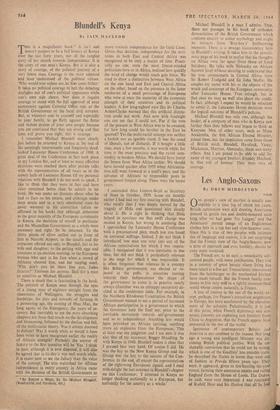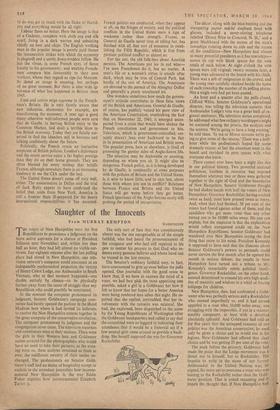Les Anglo-Saxons
By DREW MIDDLETON
PARIS
(-NNE people's view of another is usually sus-
ceptible to a time lag of about ten years. British cartoonists were still drawing Americans dressed in garish ties and double-breasted suits long after we had gone 'Ivy League,' and the Americans' mental image of an Englishman clothes him in a top hat and claw-hammer coat. Since this is true of two peoples with intimate ties of language and custom, it is not surprising that the French view of the Anglo-Saxons, now a term of reproach and even hostility, should be even more outdated.
The French are, to be sure, a remarkably self- centred people, with some justification. They live in a country of great beauty where living has been raised to a fine art. Transatlantic innovations from the hamburger to the mechanical kitchen have made inroads. But the French family con- tinues to live very well in a tightly circumscribed world whose centre, naturally, is France.
A loss of interest in the rest of the world, ex- cept, perhaps, for France's immediate neighbours in Europe, has been accelerated by the abandon- ment of the colonies. Paradoxically, it is just at this point, when French diplomacy and eco- nomic interests are exploring new, frontiers from China to Argentine, that the French appear least interested in the rest of the world.
Ignorance of contemporary Britain and America is not confined to the masses. Not long ago a young and intelligent Minister was dis- cussing British political parties. With the un- shakable conviction that he could not be wrong, which is one of the Gaullists' less amiable traits, he described the Tories in terms that went out of fashion in Pravda fifteen years ago. They were, it appeared, given to fox-hunting the year round, farming their enormous estates and ruling England from the House of Lords. The Dukes, he said, were very important. I was reminded of Rudolf Hess and his illusion that all he had
to do was get in touch with the Duke of Hamil- ton and everything would be all right.
Labour fares no better. Here the image is that of a Cockney, complete with cloth cap and silk scarf, living in a dark warren and subsisting chiefly on beer and chips. The English working man in the popular image is poorly paid (hence the innumerable strikes with which the economy is plagued) and a sorely down-trodden fellow. He has the virtue, in some French eyes, of fierce loyalty to his government: and wealthy French- men compare him favourably to their own workers, whom they regard as ripe for Moscow. So dated an image is amusing, but perhaps of no great moment. But there is also wide ig- norance of what has happened in Britain since 1945.
Coal and cotton reign supreme in the French- man's Britain. He is only faintly aware that new industries, electronics for example, are transforming the economy. A year ago a good many otherwise well-informed people were sure that de Gaulle, in barring British entry to the Common Market, had dealt a terrible blow to the British economy. Today they are faintly sur- prised to find the islanders still in business and talking confidently about the future.
Politically, the French retain an instinctive suspicion of British policies. London's diplomacy and the secret service enjoy a far higher prestige than they do on their home grounds. They are often blamed for every mishap that befalls France, although nowadays there is an increasing tendency to see the CIA under the bed.
The United States doesn't come off very well, either. The assassination in Dallas and the trial of Jack Ruby appear to have confirmed the belief that, aside from New York, America is still a frontier State ill-prepared for the heavy international responsibilities it has assumed.
French politics are conducted, when they appear at all, on the fringes of society, and the political conflicts in the United States seem a sign of weakness rather than strength. France, as General de Gaulle never tires of telling her, has finished with all that sort of nonsense in estab- lishing the Fifth Republic, which is free from partisan political conflict or almost so.
For the rest, the old folk-lore about America persists. The Americans put ice in red wine— I've seen Frenchmen do it, but no matter. A man's life or a woman's virtue is unsafe after dark, which may be true of Central Park. but hardly of the rest of America. The Americans are devoted to the pursuit of the Almighty Dollar and generally a pretty uncultured lot.
One wonders sometimes how much the govern- ment's attitude contributes to these false views of the British and Americans. General de Gaulle, of course, has publicly voiced his poor view of the American Constitution, overlooking the fact that on November 22, 1963, it emerged unim- paired from a crisis that would have shaken the French constitution and government to bits. Television, which is government-controlled, cer- tainly doesn't lean over backward to be fair in its presentation of American and British news. The popular press, here as elsewhere, is fond of presenting the gamier sides of Anglo-Saxon life.
The situation may be deplorable or amusing, depending on where you sit. It might also be dangerous. French policy, as it is being developed by de Gaulle, is continually at cross purposes with the policies of Britain and the United States. Is it wise to know little, and to care less, about those with whom you are in conflict? Relations between France and Britain and the United States will get worse before they get better. French ignorance of the Anglo-Saxons surely will prolong the period of recuperation.









































 Previous page
Previous page